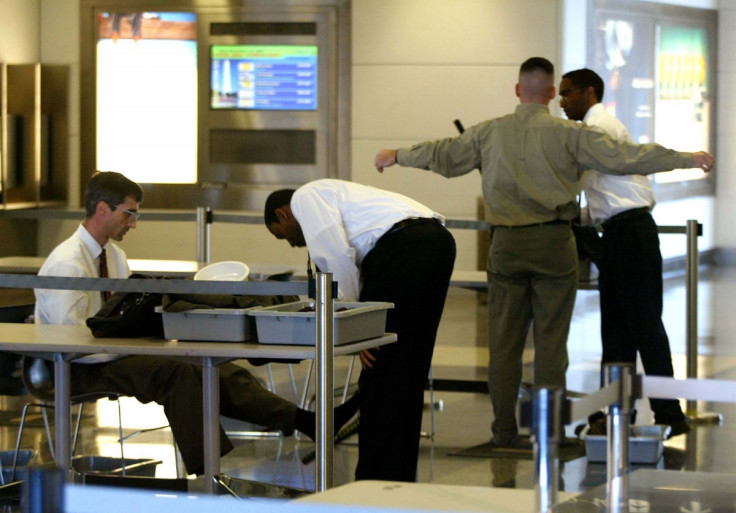Airport Terror Alert: The New 9/11 and the Surgically Implanted 'Body Bombs'

Security measures have been increased in airports in both the UK and the US over fears al-Qaeda is developing a new bomb which cannot be detected by scanners.
Britain's Department of Transport (DfT) said the increased measures are in place following the warning from US security chiefs citing intelligence reports.
It is believed the warning stems from fears Yemen-based terrorist group al-Qaeda in the Arabian Peninsula (AQAP) has travelled to Syria to link up with the al-Qaeda affiliate there, known as the al-Nusra Front, to develop bombs which can be smuggled onto aircraft.
Experts fear that the terrorists are planning an attack on the scale of the 9/11 bombings, to capture global media attention and remind the world of al-Qaeda's threat.
While officials have not described what the bomb could be, there are fears the groups may be developing a non-metallic explosive device, which could be surgically sewn inside a would-be terrorist and be undetectable from all airport scanners and security checks.
Terrorist groups have previously come up with strategies to evade airport security and blow up planes carrying hundreds of passengers.
On Christmas Day 2009, the so-called 'underwear bomber' Umar Farouk Abdulmutallab successfully carried a bomb with no metallic parts onboard a flight to Detroit with no metallic parts stitched into the fabric of his underwear.
The attack failed after the bomb failed to ignite properly, with Abdulmutallab suffering burns to his legs in the process, before being subdued by passengers and flight attendants.

British-born 'shoe bomber' Richard Reid also attempted to blow up a flight from Paris to Miami in December 2001 by hiding the plastic explosives in his shoes.
It is believed that, mercifully, the sweat from Reid's feet saved the lives of the 747's passengers as it dampened the bomb and thus foiled Reid's attempts to ignite it.
In 2006, Abdulla Ahmed Ali masterminded a so-called 'liquid bomb' made from hydrogen peroxide which could be hidden inside a drinks bottle and ignited with s small electrical charge. The plot was foiled before it could be carried out, resulting in huge changes to airport security measures.
It is now feared the terrorist groups may be attempting to develop non-metallic bombs which could be stitched inside a person's body, making it virtually impossible to detect via x-ray scanners or pat-downs.
"The surgeon would open the abdominal cavity and literally implant the explosive device in amongst the internal organs," Dr. Mark Melrose, a New York emergency medicine specialist, explained to ABC News.
Authorities previously warned AQAP's chief bomb-maker, Ibrahim al-Asiri, could be working on the 'body bombs'.
Asiri is believed to have been responsible for producing the 'underwear bomb' as well as hiding bombs inside printer ink cartridges in another failed plot in 2010.
He was also behind an attack which involved placing a bomb inside the rectum of his own brother to blow up Saudi Arabian intelligence chief Prince Muhammad bin Nayef in 2009. Again, the plot failed after the bomb went off prematurely, with the only victim of the explosion being Asiri's 23-year-old brother, Abdullah.
However, according to author and historian Michael Burleigh, there are some design flaws in using a 'human bomb'.
He wrote in the Daily Mail: "The blast is blunted by the body itself. Ninety per cent of the human body consists of water, which is a very effective blast absorber; and in this case [the bin Nayef attack] it 'shaped' the blast to go up to the ceiling rather than across the room."
Burleigh added researchers have suggested the bomb could be placed inside a human in such a way that the explosion could cause the fragments of bone to act as 'shrapnel' in a similar effect to nail bombs.
Despite the "enhanced security measures" at selected airports, both US and UK officials have downplayed the warnings, adding the extra security is out of an "abundance of caution. There has been no indication when an attack could occur and the UK security threat level has not altered from 'substantial' - a three of five level of threat it has had since July 2011.
"The UK has some of the most robust aviation security measures and we will continue to take all the steps necessary to ensure that public safety is maintained," a DfT spokesperson added.
© Copyright IBTimes 2025. All rights reserved.






















